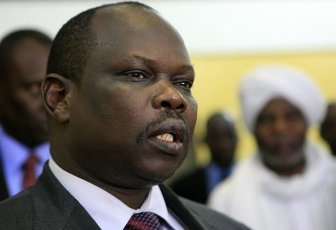Sudan and South Sudan agree to resume oil exports by end of December – official
December 2, 2012 (KHARTOUM) – A South Sudanese official announced on Sunday that he has reached an agreement with officials in Khartoum to resume his country’s oil exports via Sudanese territories by the end of December, a month late from the planned timeframe due to obstacles facing border security talks between the two neighbors.

Amum said that his meetings in Khartoum had produced positive results that invite optimism about the imminent rapprochement in relations between the two countries. He added that he expects Sudan to earn more than 100 million US dollars per month from oil exportation operations.
The South Sudanese official announced the news prior to the meeting of the joint political and security committee due to be held in Khartoum on Monday to discuss the implementation of the border security deal which was signed together with the oil deal and six other agreements known collectively as the “Cooperation Agreement” in the Ethiopian capital Addis Ababa on 27 September.
The border security deal provides for the establishment of a 10-km buffer demilitarized zone along the 1800-km common borders between the two countries.
South Sudan halted preparations to resume oil exports by the end of November citing Khartoum’s demands that its army known as SPLA disarms the rebel Sudan People’s Liberation Movement North (SPLM-N) which has been fighting the Sudanese government in the border states of South Kordofan and Blue Nile since last year.
Sudan says the border security deal binds Juba to sever ties with its former comrades-in-arms, insisting that it’s a prerequisite for allowing resumption of oil while Juba denies supporting SPLM-N and describe Khartoum’s demand of disarmament as “impossible,” in the words of Salva Kiir.
Amum echoed the claim that Khartoum’s demand is “impossible because it means their army’s interference in the affairs of another country.” He added that their army’s capabilities do not allow for such operation. He however offered his country’s cooperation to support the dialogue between the Sudanese government and the SPLM-N, saying that Juba can use its historic relations with the SPLM-N to push for sustainable peace in the two regions.
The South Sudanese official said that his meeting with the defense minister had discussed the process of security arrangements and halting of support to armed groups in the two countries in “an urgent and speedy” manner. He went on to say that the implementation of the security deal will prepare the ground for resumption of oil exports and cross-border trade.
He pointed out that Khartoum and Juba also agreed to activate the work of security and political committees to conduct investigations into the alleged support by each country to armed groups in the other. Amum stressed that his country has a vested interest in creating border security, saying South Sudan will not enjoy any stability under the military actions taking place across the border in South Kordofan and Blue Nile. “We’re a nascent state depending on oil and [therefore] we can’t play with fire” he said, adding that “we have strong desire to help Sudanese end the armed conflict”
He called on Khartoum to deal likewise and help Juba to hold dialogue with armed groups fighting it so South Sudan can enjoy peace. Amum confirmed that he delivered a letter from President Salva Kiir to President Al-Bashir containing Juba’s commitments to implement the cooperation agreements in their entirety and inviting Al-Bashir to visit Juba at any possible convenience.
Amum said that South Sudan intends to construct another pipelines route to export its oil through Kenya and Ethiopia in order to break the dependency on one export route. “There are strong indications that South Sudan territories are rife with considerable oil reserves therefore it is important that we build more pipelines to diversify the options”
The official mentioned that he did not discuss with Sudanese officials the issue of the contested region of Abyei saying that his country supports the proposal of the African Union High-Level Implementation Panel (AUHIP) which provides for the conduct of a much-delayed referendum to determine the status of the oil-producing region.
Khartoum however rejected the proposal saying that it will prevent Sudan’s Arab Misseriya tribe from voting in the plebiscite. Under the terms of the proposal, the Dinka Ngok tribe, affiliated with South Sudan, would vote in the referendum along with other permanent residents of Abyei. This would effectively leave out the nomadic Misseriya who travel south into Abyei a few months a year to graze cattle. Unless a separate deal is reached with South Sudan by early December, the AU proposal will be binding to the two sides.
Amum said that Juba would welcome the Misseriya if they crossed the borders into Abyei regardless of the results of the referendum.
The South Sudanese official revealed that he held a meeting with the deputy chairman of Sudan’s ruling National Congress Party Nafe Ali Nafe and conducted with him a detailed discussions about building strategic relations between his party and the ruling Sudan People’s Liberation Movement (SPLM) in the south.
Nafe told reporters following the meeting that he would visit Juba soon to finalize discussions with SPLM officials.
(ST)
